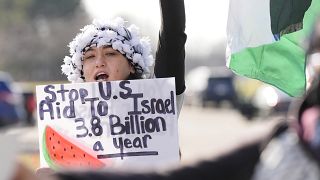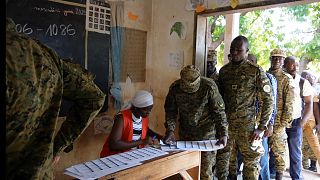UNSC
The death toll in the Gaza Strip surpassed 44,000, local health officials said Thursday (Nov. 20), one day after a new UN resolution demanding a ceasefire failed because of a US veto.
The Israeli offensive has caused heavy destruction across wide areas of the coastal territory, leading many to wonder when or how it will ever be rebuilt. Around 90% of the population of 2.3 million people have been displaced, often multiple times, and hundreds of thousands are living in squalid tent camps with little food, water or basic services.
This comes five months after the adoption of resolution 2735 which demanded an immediate ceasefire in Gaza for the month of Ramadan as well as the release of all hostages taken captive during Palestinian militant groups on Oct. 7 attack in southern Israel.
"It is deeply regretted that due to the use of the veto this council has once again failed to uphold its responsibility to maintain international peace and security," Malta's Ambassador Vanessa Frazier said after voting.
Algeria's ambassador to the UN, Amar Bendjama, regretted the outcome of the vote saying "the draft resolution was far from ideal”, but represented “the bare minimum that should have united us”.
It is the first UN resolution on the war in Gaza that was proposed by the 10 non-permanent members of the council.
“Our collective efforts to end the hostilities will not stop,” they said.
Bendjama vowed that the elected members will return soon with an even stronger resolution under Chapter 7 of the U.N. Charter, which is militarily enforceable — and they will not stop until the council takes action.
He added his country calls for "enforcing Security Council decisions and imposing sanctions on those that defy the collective will of the international community".
What was in the draft?
- In addition to demanding a ceasefire, the draft demanded immediate access for civilians in the Gaza Strip to basic services.
- It rejected “any effort to starve Palestinians” while also demanding the facilitation of full, rapid, safe and unhindered entry of aid at scale to and throughout the Strip and its delivery to all those in need.
- The text also demanded that the parties “fully, unconditionally, and without delay” implement all the provisions of Security Council resolution 2735.
- This includes the release of hostages, the exchange of Palestinian prisoners, the return of the remains of hostages who have been killed, the return of Palestinian civilians to their homes and neighbourhoods in all areas of Gaza – including in the north – and a full withdrawal of Israeli forces from Gaza.
- The draft further underscored the role of the UN relief agency for Palestine refugees (UNRWA) as the backbone of the humanitarian response in Gaza.
"Colleagues, the United States deeply regrets this council finds itself here again. The United States worked for weeks in good faith to avoid this outcome. We made clear throughout negotiations we could not support an unconditional cease-fire that failed to release the hostages," Robert Wood, US Deputy Ambassador to the UN said.
Israel estimates that about 100 hostages remain in captivity, only about 65 of them still alive.
Where is Israel headed?
Israel's war goals include enabling communities who have fled areas near the Lebanese border to return to their homes, "eliminating Hamas, securing the release of Israeli captives in Gaza, and ensuring that the Palestinian enclave would not pose a threat to Israel's security".
The nation's permanent representative to United Nations said his country would stay the course: “Israel will continue to defend itself. We will never abandon our hostages [...] We will never stop fighting for their freedom," Danny Danon said.
"If Hamas will to release the hostages and surrender the weapons, not one more shot would need to be fired,” Danon claimed.
Now dismissed Israeli Defence minister Yoav Gallant reportedly said Prime Minister Benjamin Netanyahu was responsible for holding up a ceasefire deal that would end the war and get the remaining hostages home.
Israeli newspaper Haaretz reported on Nov. 7 that Yoav Gallant told hostage families that the Prime Minister's decision-making on a hostage deal was "neither military nor political" and that the army had achieved its objectives in Gaza. His differences with the PM have been known for a while and he even explained three main areas of discord.
Many of the families of the hostages, along with tens of thousands of people who have joined anti-government protests, accuse Netanyahu of scuttling a deal in order to maintain his hold on power.
The world’s top war-crimes court issued arrest warrants Thursday (Nov. 21) for the leaders of Israel and Hamas, including Israeli Prime Minister Benjamin Netanyahu, accusing them of crimes against humanity in connection with their war that began more than a year ago.












01:56
EU foreign ministers discuss deal with Israel to increase Gaza aid
01:42
Gaza conflict overshadows EU-Southern Neighbourhood talks in Brussels
01:19
"Such good English": Trump compliments Liberian president, a native English speaker
02:06
UN report reveals 4.6 million people struggling with food insecurity
Go to video
U.S. slashes visa duration for some African nationals amid policy shift
00:58
Senegalese PM Sonko says international order is shifting to a more balanced, multilateral world